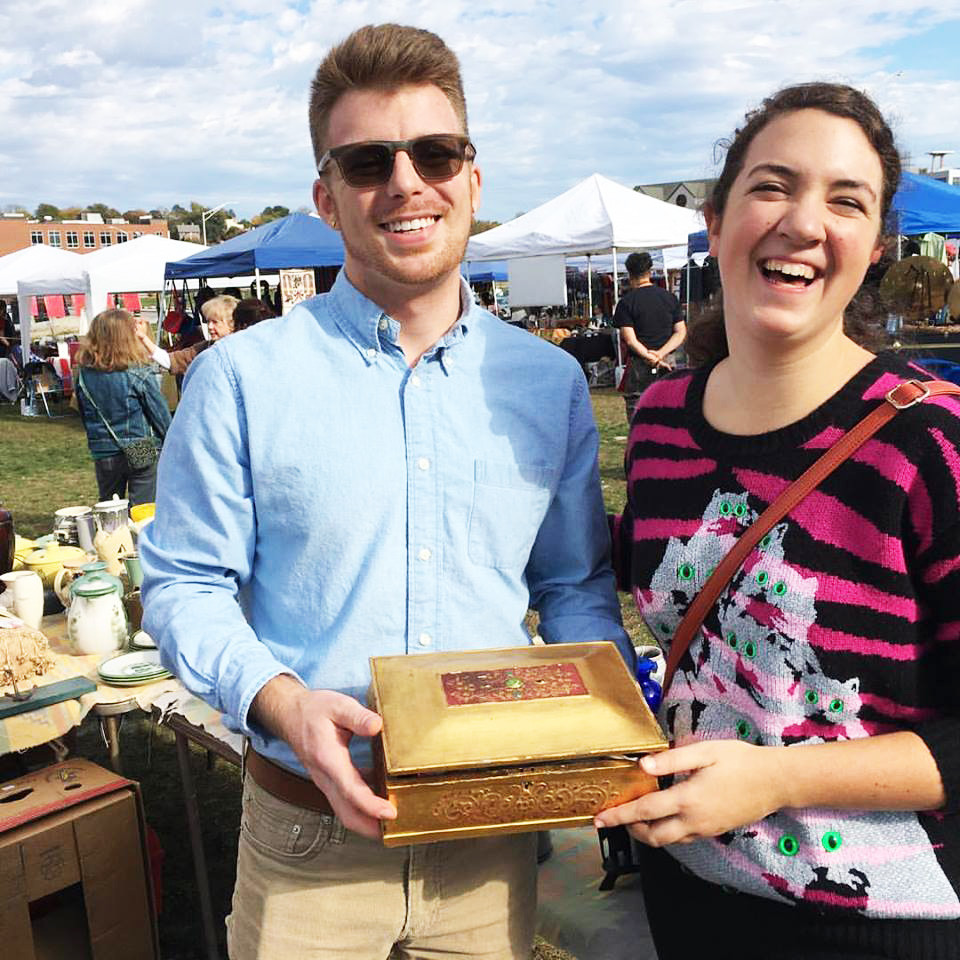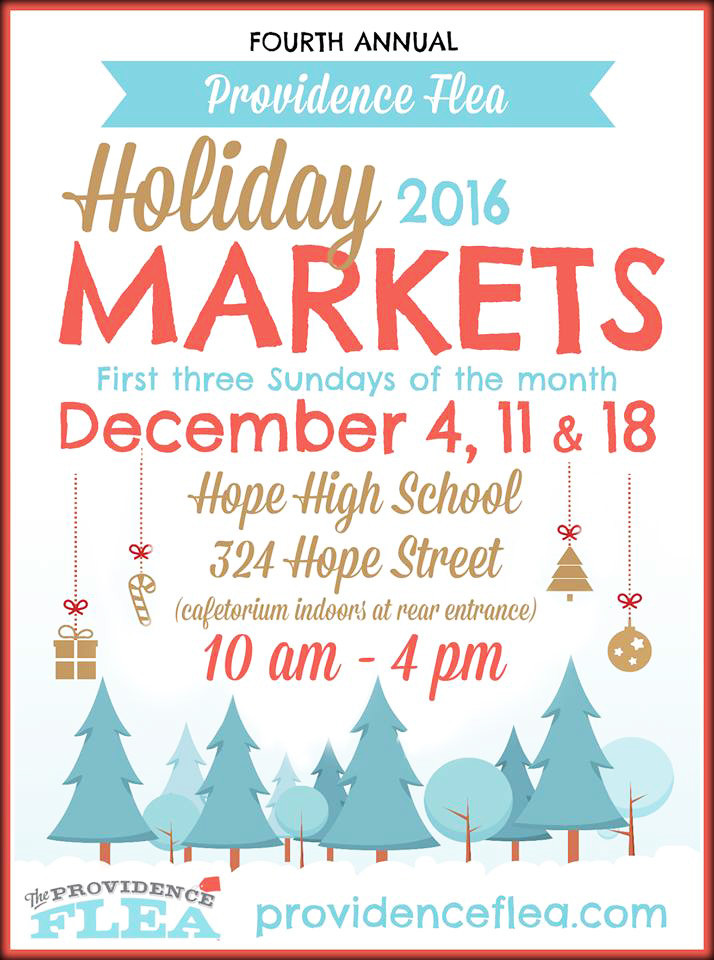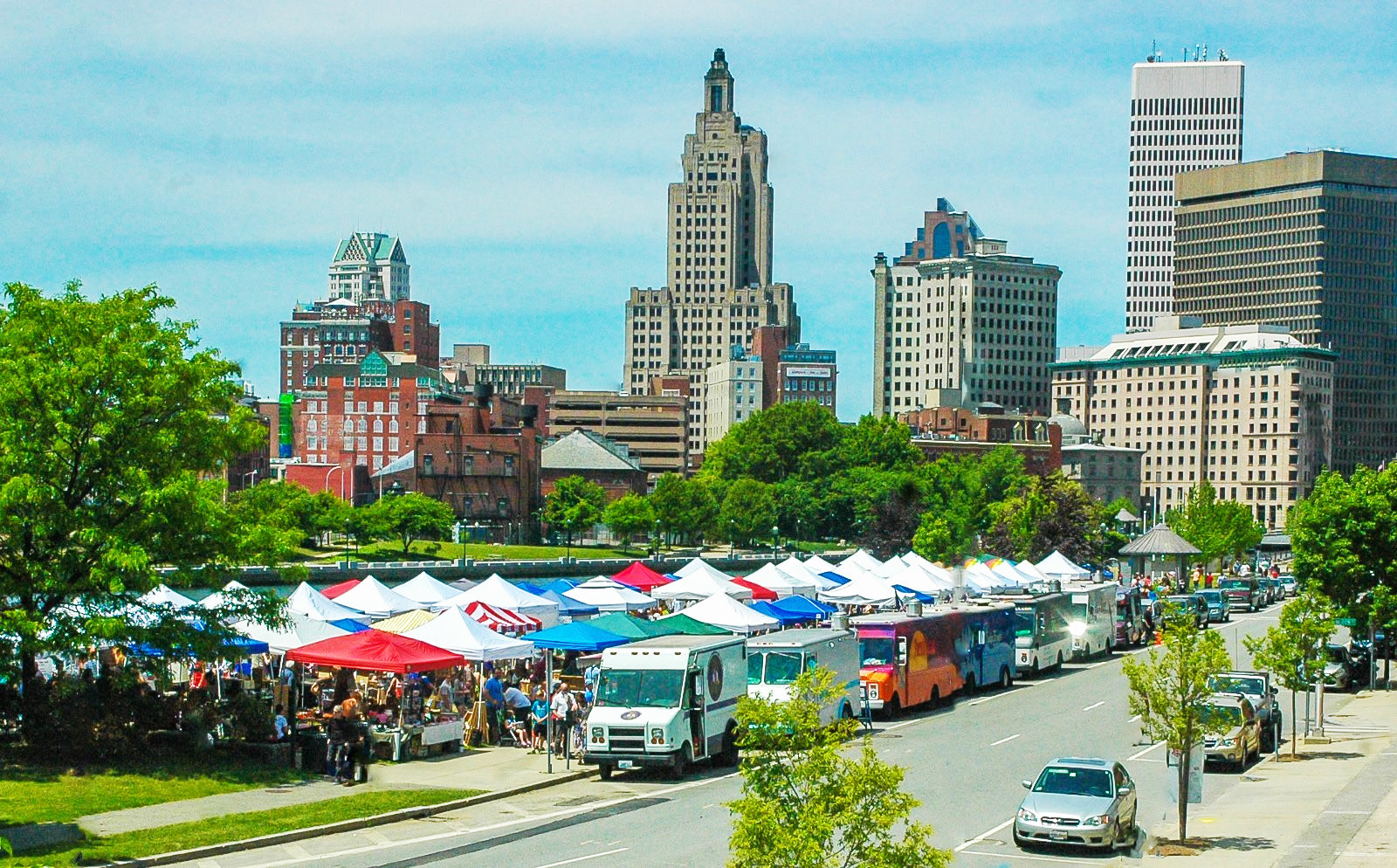The story of Providence Flea, told by its accidental entrepreneur
ConvergenceRI interviews Maria Tocco about the success and growth of Providence Flea into a cultural and economic phenomenon
PROVIDENCE – With all the focus on building entrepreneurship and sparking a revival of the Rhode Island economy, one of the areas all too often overlooked by the gurus of economic development and the innovation economy is the success of Providence Flea as a juried vintage and artisan/maker market, where an engaged community of buyers and sellers has redefined the value of all things considered.
It is not something that you may find in tourist brochures about the state or, for that matter, mentioned in those lengthy studies of future economic development strategies on how best to lead Rhode Island toward a new level of prosperity.
But Providence Flea does represent a vibrant community of entrepreneurs and small businesses, filling an important cultural niche in a very human endeavor: shopping and finding value outside of the big box stores, involving intimate, face-to-face conversation and bargaining. In short, it is all about conversations and relationships.
ConvergenceRI asked Maria Tocco, the driving force behind Providence Flea, to talk about the sense of community that has evolved around Providence Flea and why it has proven to be so successful. Tocco recently left her day job as a communications director to focus full-time on Providence Flea.
Here is the interview with ConvergenceRI:
ConvergenceRI: What’s the latest on Providence Flea? How are you preparing for the holiday seasons?
TOCCO: The Flea ended a fourth successful season along South Water Street in September this year, and was invited by the I-195 Redevelopment District Commission to “activate” another undeveloped parcel of land made available by the relocation of the I-195 highway.
So we extended our outdoor season this year for the first time with seven Fall Markets held through October on Parcel 28, at the corner of Clifford and Chestnut Streets downtown.
Then, just as we were closing out the Fall Markets, we were invited to host a “pop-up” market as part of Indowncity.com’s “Celebrate Downcity 2016” holiday shopping event on Small Business Saturday, Nov. 26, from 12 noon to 5 p.m.
We’ll have more than 20 vendors on Grant’s Block and along Westminster Street, which will be closed from Union to Mathewson streets for our vendors.
We were also invited to help the French American School plan a Marchés de Noël [a festive outdoor European winter market]. The event that had fallen off their calendar for several years, and the acting head of school has sought to revive the tradition.
For that, we’ve arranged food trucks serving crepes and pommes frites, hot coffee and cocoa, and over a dozen artisan and craft vendors to be held in their courtyard behind the school on John Street in Providence on Saturday, Dec. 3, from 10 a.m. until 2 p.m. The school is inviting the general public to attend with the aim of attracting new and prospective students and families to tour the school and learn about its programs.
We’re also going back to the East Side for our fourth annual Sunday Holiday Markets, for which we’ll have a rotating lineup of more than 50 vendors each week, along with food trucks and live music. Due to the demand by vendors we’ve added a third market this year, and those take place on Dec. 4, 11 and 18, from 10 a.m. through 4 p.m. at Hope High School, at 324 Hope St. It's a great location, and I love the idea of using a public school building as a hub for the community.
It's been surprising how many patrons made a point to tell us that they came inside to see the century-old building that they once attended.
ConvergenceRI: How would you describe the sense of community that has evolved around Providence Flea, and the relationship between vendors and customers?
TOCCO: Bringing together like-minded people in one place has been a thrilling experience and feels important when so much of connecting today is by text or online. There was an almost immediate sense that the community was wrapping itself around the Flea. Some of the news media took notice: we were named the place for "best vintage finds" by the editors of Rhode Island Monthly, Yankee Magazine and Romantic Homes after our first season.
We started seeing many of the same people coming every week, and watched relationships develop on the spot. We then started seeing patrons who became vendors, vendors who became patrons, and vendors becoming friends – and some becoming partners.
Their collective response was overwhelmingly positive, creating repeat business and a growing attendance from both groups. We’ve had great luck with the weather, and about midway through the first summer it felt like it was beginning to stick.
Early birds would line up for a coffee at the coffee truck, browse the new vendors, sit on the boardwalk or meet up with friends on the helipad.
Lots of patrons came to get a bite to eat at the food trucks and sit on the wall or a bench overlooking the skyline and the river. They came to check out the live music.
Some would just walk up to our tent and very excitedly show us their “find,” or thank us for putting on the market. Patrons willingly would smile and pose for us with their friends or with the vendors, and we’d post the photo to our social media channels with their permission. In turn they would share the post for others to see who had never been to the Flea, and then those people made their way to us. And that’s how it has been for four years running.
ConvergenceRI: How do you communicate within your network? Is it a combination of emails and tweets? Is it driven by social media?
TOCCO: Friends mock me when I say this, but it’s true – I adopted Martha Stewart’s “omni-media” approach: write once and publish twice, or three times (or in the case of Martha Stewart, more like 10).
For the Flea, I would write a blog on a different vendor three times each week and schedule the posts to my website, then schedule a later post to Facebook and one to Twitter with links to the blog. Lastly, I would copy and paste the blog into a newsletter to promote the upcoming market.
I also use Instagram, Pinterest and traditional print ads, and promote the newsletter with an opt-in sign-up page across all my social channels. The result has been exponential, with 11k likes on Facebook, 5.4k followers on Instagram, 4k on Twitter and 4k on my newsletter list. Now that the Flea is more established, I don’t have to be quite so aggressive in promoting it.
ConvergenceRI: What lessons have you learned as a start up entrepreneur in this market space? There's a lot of noise in Rhode Island around small businesses, the start up economy, social enterprise?
TOCCO: I’ve learned that there is a multitude of resources in Rhode Island, many of them free, to help a small business get off the ground. And the state is small enough that if you don’t or can’t find what you’re looking for, there is someone you probably do know who can help you find it.
I’ve also learned there is a lot of “self–actualization” going on among entrepreneurs in the state, both to realize a dream or pursue a passion, as well as to have more control over their work schedules and their quality of life.
ConvergenceRI: How important is a sense of community, diversity and inclusiveness in the success of Providence Flea?
TOCCO: The Flea is a juried vintage and artisan/maker market, and that is to ensure that we’re attracting a diverse group of high-quality vendors, as well as keeping out merchandise that is mass-produced or licensed, or typically sold through clubs, franchises or independent sales reps on a large scale.
The market has over a dozen categories of vendor merchandise. We’re always looking for items and vendors that we haven’t seen anywhere else. We’ve had more than 400 vendors apply to the market this season alone, and more than 350 of them have “vended” with us this year.
The Flea strives to be inclusive and features a community nonprofit every week. Over the years that has included popular organizations, such as: Waterfire, the RISD Museum, The Steel Yard, the Providence Preservation Society, the Providence Animal Rescue League, New Urban Arts, ecoRI News, Youth Pride and many, many others.
Last year, we collaborated with Johnson & Wales University to host a pop-up market for their family weekend. We're always open to partnering with other organizations to introduce Flea vendors to new audiences.
Flea patrons tell us all the time how much they appreciate that there is always something new and different each week, and that factor has helped not only to grow the Flea community, but also to cultivate a loyal following.
ConvergenceRI: Is there a symbiotic relationship with food trucks and Providence Flea, similar to monarch butterflies and milkweed?
TOCCO: It was apparent to me from the beginning that food trucks were going to be an integral part of the Flea experience, and I’m grateful that so many have wanted to partner with us.
In our first year we only had a handful of trucks participate, and that number has grown every year; this year, more than 25 trucks rotating through the market. Because they each have their own following, they are an added attraction that we don’t take for granted. We promote their presence and vice versa. We’ve also partnered with FoodTrucksIn.com to place a widget on our web site that shows which trucks are coming each week and where the trucks are serving when they are not at the Flea.
ConvergenceRI: What are the takeaways that folks from CommerceRI, the state's economic development agency, and the Greater Providence Chamber of Commerce, the leading business group, might learn from Providence Flea?
TOCCO: I don’t know that I have any lessons for the experts in these organizations. I have great respect for the work they are doing, and I believe their work is moving our economy in the right direction.
What I would like to see is that we continue to promote the programs and resources that are available – SCORE, SBA, SBDC, and CWE – and maximize opportunities to access capital, acquire affordable healthcare and grow the 90,000+ new and existing small businesses in Rhode Island – including mine!
ConvergenceRI: How has Providence Flea changed your own career path, in terms of happiness and fulfillment?
TOCCO: What started as a “side hustle” in just a few short seasons quickly grew to rival the commitment and demands of my full-time “day job.”
For 25 years I’ve loved being in the communications field in some form or another. I started as a copywriter, working for an international languages and tours company, and eventually rose to manage their language/travel publications for more than 30 offices worldwide.
I moved abroad to manage their publications office in London, working with graphic designers, translators and photographers – traveling throughout Europe to oversee translations, photo shoots and press checks.
I later worked for and led Cultural Survival, the indigenous rights nonprofit in Harvard Square founded in the 1960s that sourced raw materials from indigenous groups in South America for Rainforest Crunch, The Body Shop and fair trade coffee companies.
It was in that first half of my career when I really got to flex my creative muscles. In the second half, however, I continued to climb the proverbial ladder, moving into positions with longer titles and higher salaries, more stress and less creative duties. I was mostly involved in managing people and projects, crisis communications and press relations.
Over the past several years I had become interested in the “buy local” and maker movements, and “creative place-making.” Launching the Flea brought back opportunities to write, design and promote local vendors while creating a venue that morphed into an incubator for low-tech “micro-businesses.”
So I consider myself somewhat of an accidental entrepreneur, after having left my day job this summer for other creative pursuits. I will still have to work through the summer to keep the Flea growing, but the level of satisfaction I get from working with vendors and this community has eclipsed any fear I had about taking the leap to make it a full-time gig. I feel that I’m working just as hard, but I’m less stressed, more fulfilled and feel my quality of life is greatly improved.










